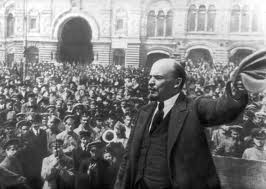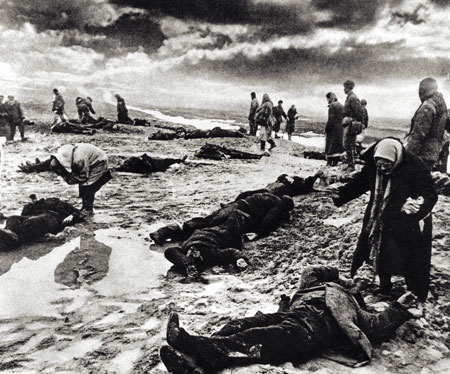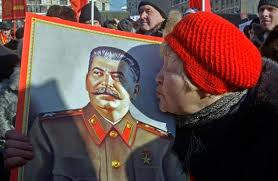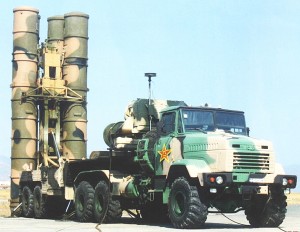THE SOVIET UNION— Environmental Degradation: Some Historical Antecedents
From our archives (revised edition, first published in 1990)—
The ecological abuses triggered by the pressure to develop in a hurry were compounded after WW2 by the bureaucratism and careerism that had begun to creep into many operations…”
 PREFATORY NOTE: I wrote this article in the Fall of 1990 at a moment of heightened propaganda against the putative ills of communism and the Soviet Union, in particular, as the Western “democracies”, with the US in the lead, and already smelling the impending disintegration of their greatest ideological foe, stoked the fires of change and rebellion.
PREFATORY NOTE: I wrote this article in the Fall of 1990 at a moment of heightened propaganda against the putative ills of communism and the Soviet Union, in particular, as the Western “democracies”, with the US in the lead, and already smelling the impending disintegration of their greatest ideological foe, stoked the fires of change and rebellion.
In this epochal process, Mikhail Gorbachev (left) played a pivotal role for which he has been both praised and—in my view— justifiably damned inside the former USSR. But while his place in history remains to be determined, the facts are clear and indisputable. After assuming the reins of power in 1985, Gorbachev’s reforms as well as summit conferences with Ronald Reagan and his reorientation of Soviet strategic aims contributed to the end of the Cold War, ended the political supremacy of the Communist Party of the Soviet Union (CPSU), and led to the dissolution of the Soviet Union. For these efforts, the West, recognizing an ally, awarded Gorbachev the Nobel Peace Prize in 1990 and the Harvey Prize in 1992 as well as Honorary Doctorates from Durham University in 1995,[1] Trinity College in 2002[2] and University of Münster in 2005.
Not missing an opportunity to put as many nails in the coffin of their former enemy as possible, the western media crowed frequently about the “inevitability” of the USSR’s downfall due to its inherently “inferior” political and economic system, one which, it was loudly proclaimed, was riddled with cronyism, rigidities, corruption, and total indifference to the fate of the environment. Considering the record of the West, and especially the United States in these matters, it took some cheek to point the finger at the Soviets for such sins, but the power of the Western media is so stiflingly total that few voices deemed it possible to file a dissenting view.
For what it’s worth, honest dissent in this case could not have denied the USSR’s political errors. The Soviet Union, after all, perennially on the defensive, somewhat paranoid after decades of encirclement and intrigues, was usually trapped in complicated historical processes that invited mistakes. Many such mistakes stemmed from cataclysmic events over which the Soviets exercised little control, like the Nazi assault in 1941. Still, despite such painful paucity of options the USSR probably gave a far better and honorable account of itself than its far richer opponents. (The professional anticommunist punditocracy would probably choke on that statement and I wish they did. The world would be rid of some very toxic layer of manure). But the purpose of this paper is not to make a comprehensive comparison between capitalist and socialist nations, for which this is hardly the place, but to look at the environmental record of the USSR, and, if possible shed some light into its historical mainsprings. We must concede at the outset that in the area of environmental protection the USSR—the largest nation on Earth—racked up a dismal record in practically every major ecosystem to be found in its eleven timezones. But, here, at least, I believe the historical context goes a long way to explain this failure, something near impossible in the case of the West. The reasons for this position are set forth in the facts and arguments in the article that follows. One important caveat: It must be noted that the environmental record has not improved substantively since the overthrow of communism; if anything, under a regime of runaway kleptocratic capitalism, it may have gotten dramatically worse.—Patrice Greanville
___________________________________________________________________________
The Historical Framework for the Ecological Degradation of the Soviet Union
Let’s begin by taking a look at a summary provided by James Ridgeway, a dependable American journalist. Ridgeway, a frequent media critic, used to be a columnist for The Village Voice:
(Moscow)- A survey of the Soviet environmental situation reveals a country in desperate straits.
The USSR in Crisis, September 1990).
The WiKipedia provides a more recent assessment:
The Soviet Union transformed, often radically, the country’s physical environment. In the 1970s and 1980s, Soviet citizens, from the highest officials to ordinary factory workers and farmers, began to examine negative aspects of this transformation and to call for more prudent use of natural resources and greater concern for environmental protection.
In spite of a series of environmental laws and regulations passed in the 1970s, authentic environmental protection in the Soviet Union did not become a major concern until General Secretary Mikhail Gorbachev came to power in March 1985. Without an established regulatory agency and an environmental protection infrastructure, enforcement of existing laws was largely ignored. Only occasional and isolated references appeared on such issues as air and water pollution, soil erosion, and wasteful use of natural resources in the 1970s. There were various reasons for not implementing environmental safeguards. In cases where land and industry were state owned and managed, when air and water were polluted, the state was most often the agent of this pollution. Second, and this was true especially under Joseph Stalin‘s leadership, the resource base of the country was viewed as limitless and free. Third, in the Cold War rush to modernize and to develop heavy industry, concern for damage to the environment and related damage to the health of Soviet citizens would have been viewed as detrimental to progress. Fourth, advanced means of pollution control and environmental protection can be an expensive, high-technology industry, and even in the mid-1980s many of the Soviet Union’s systems to control harmful emissions were inoperable or of foreign manufacture. (Geography of the Soviet Union)
Effects of the East-West conflict
 The 46-year-old Cold War and its older predecessor, the policy of communist containment unleashed at the end of World War I by the victorious Western powers, cost the Soviet Union dearly.
The 46-year-old Cold War and its older predecessor, the policy of communist containment unleashed at the end of World War I by the victorious Western powers, cost the Soviet Union dearly.
The Bolshevik regime that took power in 1917 found a nation in ruins as a result of Russia’s calamitous participation in World War I. Indeed, Russia at the time was an improbable candidate to launch a socialist utopia. A backward, largely agrarian nation with a tiny industrial nucleus, it hardly fitted the Marxian vision of a mature capitalist civilization capable of providing the abundance necessary to guarantee political and economic democracy.
That simple fact was clear to most Western leaders, but their deep hostility towards the new Soviet state was not rooted in the reality of the situation, but in the new system’s promise. What if the Soviets showed the world that a worker-led revolution could assure peace and prosperity for all? What if the new state’s industrial clout surpassed the West, and, not inherently prone to recessions or depressions, continued to develop at an uninterrupted pace until it became not only a political threat by way of consumerist example but a very real military threat as well?
To wait and do nothing was a gamble the Western rulers could ill afford: socialism had to be stifled in its cradle. But how to proceed? The most reliable option, though callous, was outright military intervention buttressed by economic strangulation. It was chosen, practically by consensus, as the best way to save the “civilized world.” (In our own time and backyard, a replay of this policy targeted Sandinista Nicaragua until the citizens of that nation, in their “assisted” wisdom, chose Violeta Chamorro, a pro-Washington candidate, as president.)
The opportunity for toppling the Bolsheviks presented itself in the inevitable fact that in most social upheavals a nation divides itself along class and property lines. In Russia after 1917 there were many powerful people who disagreed vehemently with the chief objectives and methods of the revolution. They soon found powerful external allies ready and eager to support them in a counter-revolution. These outside forces–14 countries in all–sent 180,000 troops and armed and trained 300,000 anti-Bolshevik troops within the Soviet Union in a three-year intervention that almost overthrew the new government. The U.S. participated in these pro-Czarist adventures; American troops did not leave Vladivostok until 1923. At the end of the civil war Russia was again a devastated country.

Bolshevik soldiers killed by members of the Czechoslovak Legion, aided by the American Expeditionary Force in Vladivostok. Meddling in the affairs of the newly born Soviet Union began at its very inception. US, French, British, and Japanese forces intervened along with a host of minor powers to help restore the Czarist dynasty. The last American soldiers left Siberia in April, 1920.
The failure of military intervention put the West on its second strategic track: longterm economic strangulation. Since the Soviets cold not be overthrown, it was now absolutely imperative to make their economic model seem a total and permanent failure. Two methods eventually evolved to insure this goal: total economic and political isolation (the famed “cordon sanitaire” that treated Bolshevism as a dangerous contagious disease) and an all-out arms race. The latter would come into full swing right after the end of WW II as a vital part of the Cold War.
While economic strangulation made it extremely difficult for the new regime to obtain machinery and supplies needed to restart and modernize its economy, the arms race was calculated to take its toll in a more insidious way. Because of the severe disparity in economic size (the U.S. GNP has been at least 6 times larger than the USSR’s for most of the 20th century) an arms competition between the two blocs could prove highly affordable and profitable to the West but ruinous to the Soviets. In fact, having to match the U.S. dollar for dollar in the arms competition not only derailed Soviet civilian priorities, but eventually contributed to the crippling of their economy. Gorbachev’s reforms, if nothing else, were a direct response to this situation. 
German soldiers baffled by misplaced signs as they advance into Russia during Operation Barbarossa.
Despite Stalin’s massive industrialization effort in the 1930s (much of it directed toward infrastructure and military goods— in keeping with the idea of “socialism in one country”, and the realization that the capitalist powers and the fascist powers would try a military “solution” to the “Communist threat” at the first propitious moment), the resulting Soviet inability to turn out a plentiful supply of quality consumer goods had its anticipated political effects. At home, it sowed disaffection among the citizenry; abroad, as part of a huge anti-communist propaganda campaign that rarely let up since 1945, it served to “confirm” the supposed incapacity of Soviet-style socialism to “deliver the goods.” These political goals were quite desirable from a Western viewpoint, but the policy of encirclement eventually had an unintended effect: it forced the USSR to become a true military superpower.
Confronted with an almost uniformly hostile world, and the ever-growing threat of another invasion my Western armies–especially by the rising Fascist powers–Moscow in the 1930s had no choice but to devote precious resources to heavy industry and weapons manufacturing. Starting from scratch, Soviet planners were instructed to design a complex economy to be run from the center–an extremely difficult undertaking under the best of circumstances, and a nearly impossible feat under wartime conditions. Their solution to the demand for rapid development was simple and logical: the would try forced-march industrialization. Unfortunately, even today an experiment in forced-march industrialization cause by the threat of impending war would doom environmental concerns to irrelevancy. In the 1930s, then the Soviet infrastructure was being laid down, the very notion of ecological limits was unheard of.
The ecological abuses triggered by the pressure to develop in a hurry were compounded by the bureaucratism and “careerism” that pervaded most operations. In a way, that too was largely inescapable in the historical climate of the ’30s and ’40s. With performance evaluation measured strictly along bureaucratic and party lines, and with planners, managers, technicians, engineers, scientists, farmers and other key economic personnel working under constant pressure to fill quotas at any cost, it would have been miraculous if someone had put ecological or humane considerations above his own interest. The ravages caused by forced-march industrialization and personal careerism were dwarfed, however, by the human, animal, and ecological losses suffered by the Soviet Union when the Nazi armies finally swept eastward in 1941.
Ecological and human devastation on an unprecedented scale
Of all combatants in World War II, the Soviet Union paid by far the highest price. The scope of the Soviet sacrifice has been well documented by MIT Professor Harold Freeman. (See, for example, Toward Socialism in America). The giant arsenal ordered by Stalin and assembled at terrible national cost–from five billion rubles and one million men in 1934 to 34 billion rubles and 7.3 million men in 1939–made it possible for Soviet military strength to defeat the Nazi armies encircling Stalingrad and Leningrad–victories that turned the tide of the war. (As is well known, under the so-called “Lend-Lease” program the US provided assistance to its allies, including the USSR. A total of $50.1 billion— equivalent to $611 billion today—worth of supplies were shipped: $31.4 billion to Britain, $11.3 billion to the Soviet Union, $3.2 billion to France, and $1.6 billion to China. While these supplies were critical at some junctures, it is incorrect to say that the Soviet Union survived the Nazi onslaught chiefly as a result of American largesse.)
BELOW: Soviet soldiers attempt to set up a beachhead under heavy German bombardment in Kiev, 1943.
The disproportionate burden borne by the Soviets during the war can be gleaned from some eloquent statistics. From 1941 to Normandy in June of 1944, Nazi Germany kept two to eight divisions on the Western front and, except for the first six months of that period, an average of 180 divisions on the Russian front. Repeated pleas from the Russians to their allies to open another front in the West to relieve pressure in the East went largely unheeded. Until the victory at Stalingrad, the Soviets alone faced the full might of the Nazi ground military machine. As a result, by conservative estimate, 14 million Soviet soldiers died in the struggle, plus 6 million civilians–fifty times the American casualty rate, which, of course, included no civilians. Visualized another way, the Soviet losses amounted to three times the population of California in the 1940s. In Leningrad alone, during the Nazi siege, up to 850,000 people perished from bombardments, disease, starvation and cold, but neither the resistance nor the war effort could be stopped. Hence, in one single battle, Leningrad, the Russians sustained 17 times more casualties than America did in almost 20 years of intervention in Vietnam.
Picking up the pieces
The end of the war found the USSR in a paradoxical situation. The Red Army controlled most of Eastern and Central Europe, but the homeland was again at a point in which forced-march industrialization was necessary. To make matters worse, the 1946 harvest failed, and 1947 brought starvation to many. The extent of the destruction was impressive even by modern standards. The war had completely or partially destroyed 15 large cities. 1,710 towns, 70,000 villages, 32,000 enterprises, 6,000,000 buildings, 65.000 kilometers of railroad track, 3,000 tractor stations, 13,000 railroad bridges, 10,000 power stations. Animal losses were not reliably recorded, but various archivists put the number conservatively between 25 and 45 million wild and domestic creatures.
In a nutshell, this is the historical backdrop for Russia’s drive toward economic and military parity with the West at any cost in the years following the “Great Patriotic War” and it is within this framework that we must judge current Soviet environmental degradation and the nation’s efforts to rectify it. For, with the advent of the Cold War, and suggestion by Western leaders that a nation so severely crippled actually represented an imminent danger to the security of the “free world,” wartime production and its attendant paranoid psychology again took hold of the Soviet economy. Unfortunately, Cold War “pragmatism” did more than simply deform the economy; it buried for decades the possibility of bringing to the forefront more humane and ecologically enlightened policies. For much of that dislocation, not to mention the incalculable human, ecological, and animal suffering involved in long years of conflict, Western [bourgeois] leaders must bear a heavy responsibility.
_________________________________________
Patrice Greanville is The Greanville Post‘s editor in chief.
This article first appeared in the magazine The Animals’ Agenda (Sept. 1990). At the time, the author served as Editor at Large for that publication. The article was prompted by the continuous vilification of the USSR by the American press in particular, a campaign of malicious propaganda that continued right up to the moment the USSR imploded in 1991. This is a slightly revised version.
With special thanks to my editorial associate, B. Havlena, for invaluable support.
¶
ADVERT PRO NOBIS
________________________________________________________________________________________________________
IF YOU THINK THE LAMESTREAM MEDIA ARE A DISGRACE AND A HUGE OBSTACLE
to real change in America why haven’t you sent at least a few dollars to The Greanville Post (or a similar anti-corporate citizen’s media?). Think about it. Without educating and organizing our ranks our cause is DOA. That’s why our new citizens’ media need your support. Send your badly needed check to “TGP, P.O. Box 1028, Brewster, NY 10509-1028.” Make checks out to “P. Greanville/ TGP”. (A contribution of any amount can also be made via Paypal and MC or VISA.)
THANK YOU.
____________________________________________________________________________________________________










